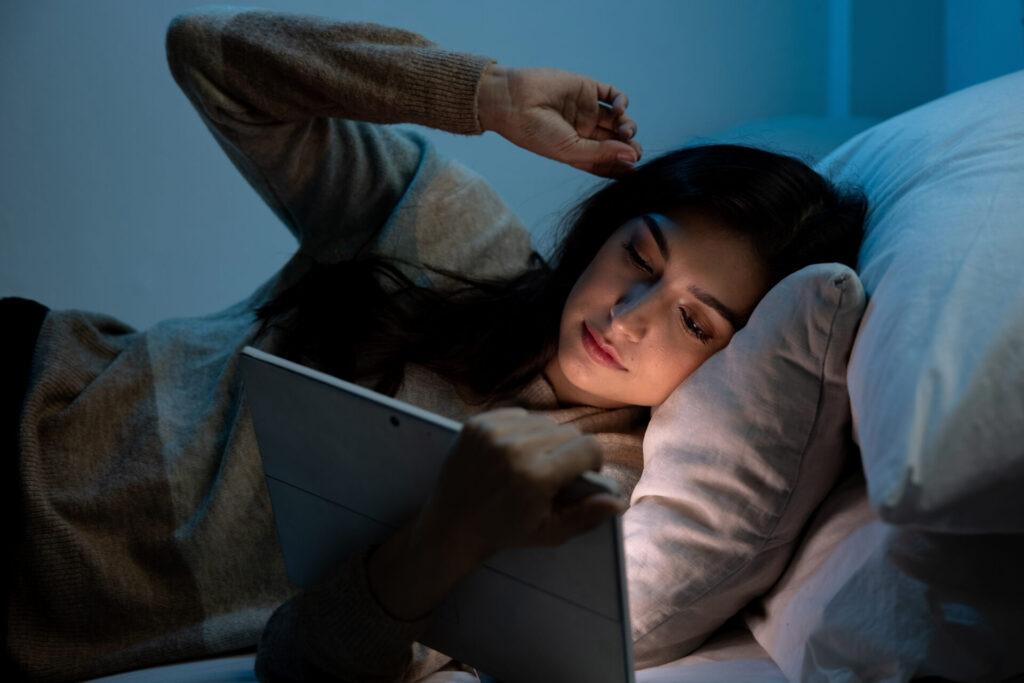Blue light is a natural part of sunlight but also comes from screens and LED lighting. While small amounts aren’t harmful, prolonged exposure to blue light from digital devices can cause eye strain, disrupt sleep, and contribute to retinal stress over time. Simple habits like taking regular breaks, adjusting screen settings, and using blue light-filtering lenses can help protect your eyes and reduce discomfort. Regular eye exams are key to managing digital eye strain and maintaining healthy vision.
It seems like everywhere you look—your phone, your laptop, even your TV—someone is warning you about blue light. But what exactly is it? And is it really hurting your eyes, or is it just another digital-age buzzword?
Let’s clear things up.
What Is Blue Light, Anyway?
Blue light is part of the visible light spectrum—meaning it’s the kind of light your eyes can actually see. It has a short wavelength and high energy, and it’s everywhere. Sunlight is the primary source of natural blue light. But in today’s screen-filled world, most of us are getting extra doses from digital devices, LED lighting, and fluorescent bulbs.
So, if it’s part of natural light, why all the concern?
The Problem Isn’t Blue Light Itself—It’s How Much We’re Getting
Your eyes can handle a little blue light. The trouble comes from prolonged exposure, close range, and cumulative strain—which describes most people’s relationship with their phones, computers, and tablets.
We’re spending hours each day staring into screens that emit concentrated blue light. Unlike UV light, which your cornea and lens can block, blue light passes straight through to your retina. That means extended exposure might have long-term effects on your vision.
Can Blue Light Damage My Eyes?
Research is ongoing, but here’s what we do know:
Blue light can contribute to digital eye strain
That’s the aching, dry, tired sensation you feel after a long day of screen time. It’s not just in your head—it’s your eyes working overtime to focus and filter.
There’s growing concern about retinal stress
Some studies suggest that long-term exposure may be linked to retinal cell damage. While we’re still learning about the full effects, this is enough to make eye care professionals pay attention.
It disrupts your sleep
Blue light tricks your brain into thinking it’s daytime, which suppresses melatonin, the hormone that makes you feel sleepy. That’s why scrolling through your phone at 11 p.m. can make it harder to fall asleep—even if you’re tired.

Should I Be Wearing Blue Light Glasses?
Short answer: It depends.
If you’re spending multiple hours a day on screens, you might benefit from blue light-filtering lenses. They don’t block 100% of blue light, but they do reduce glare and minimize the strain that can cause discomfort, headaches, or trouble focusing.
If you already wear prescription lenses, you can ask your eye doctor to add a blue light filter to your next pair. If you don’t wear glasses, over-the-counter blue light lenses might offer some relief—but it’s always best to check in with a professional before investing.
What Else Can I Do to Protect My Eyes?
Here are some smart habits we recommend to all of our Middle Georgia patients:
- Follow the 20-20-20 rule. Every 20 minutes, look at something 20 feet away for 20 seconds.
- Use screen filters or switch your devices to night mode in the evenings.
- Adjust lighting to reduce glare—avoid sitting in the dark with a bright screen.
- Blink more. It sounds silly, but people blink less when staring at screens. That leads to dry, irritated eyes.
- Get regular eye exams. We can spot the signs of digital strain and recommend the right lenses, treatments, or behavioral tweaks for your routine.
Bottom Line: Blue Light Isn’t Evil, But It’s Not Harmless Either
We’re not here to scare you off your screen time—we get it; it’s part of modern life. But your eyes weren’t designed for hours of daily digital exposure. Paying attention to symptoms like fatigue, headaches, or blurry vision isn’t just smart—it’s proactive eye care.
Don’t Get Blue About Your Eyes – We’re Ready to Help
If you’re concerned about blue light or noticing changes in your vision, don’t brush it off. Our Macon eye doctors are here to help you sort through the noise and find real solutions that work for your lifestyle. Call 478-923-5872 to learn more or make an appointment.
Related Articles:
